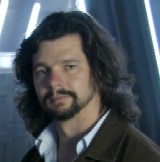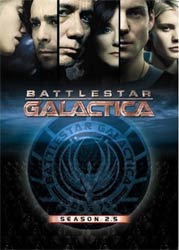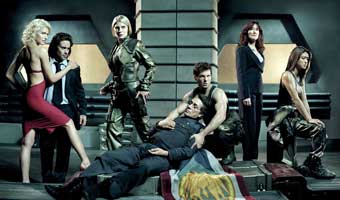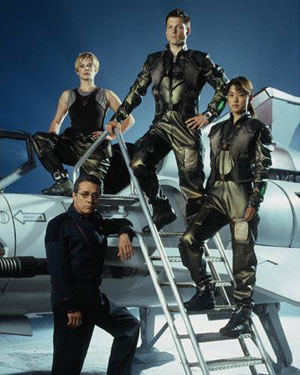 Over the course of two seasons Battlestar Galactica has gone from “They brought back that crappy show?” to one of the smartest and relevant programs on television (to be fair, it was always smart and relevant, it’s just that a lot of us didn’t realize it early on). The man behind the show is Ronald Moore – hardcore fans of Galactica know Moore from the show’s weekly podcasts, which are essentially commentaries for the latest episodes that you can download from iTunes, a really cutting edge and fun way for the show runner to speak directly to the viewers.
Over the course of two seasons Battlestar Galactica has gone from “They brought back that crappy show?” to one of the smartest and relevant programs on television (to be fair, it was always smart and relevant, it’s just that a lot of us didn’t realize it early on). The man behind the show is Ronald Moore – hardcore fans of Galactica know Moore from the show’s weekly podcasts, which are essentially commentaries for the latest episodes that you can download from iTunes, a really cutting edge and fun way for the show runner to speak directly to the viewers.
The second half of Galactica’s second season is hitting DVD today, and the final episode is a shocker – so much so that, if you haven’t seen it, you may want to be wary of this interview, which discusses elements of that episode and the massive impact it has on the show in the third season. That season ending shocker was great not just because it was unexpected but because it was one of the few times a successful show changed up the status quo simply because it would be a good story.
Season three of Galactica premieres on October 6 on the SciFi Channel, and the show is moving to a new timeslot, airing an hour earlier at 9pm. Make sure you buy season 2.5 on DVD from CHUD by clicking here and then watch all the webisodes leading up to the premiere – two webisodes a week giving the background of the resistance that is gearing up to fight the Cylon occupation. Watch the webisodes on scifi.com.
During the season two finale, when Chief launches into the speech that Mario Sava gave at Berkeley as part of the Free Speech Movement, I cheered.
Moore: Really?
I really did. I’m a 60s activism nerd. You guys do that sometimes – you will quote or very closely echo things from the politics of the real world. Where do you guys draw the line to make sure that you’re not pulling the audience out of the politics of Galactica and out of the show itself?
Moore: It’s really subjective. There is no real line; we judge it on a case by case basis. We judge it on our internal mechanism on that kind of thing, trying to feel when it pulls you out, and there’s no rhyme or reason beyond that.
Sometimes it’s even language that will throw you out. I remember there was an episode from the first season, when Helo and Sharon were down on Cylon-occupied Caprica, the actors improv’d a line – which we left in the show – where Sharon said, ‘We could head to that barn and kick it for a while.’ I kind of went, ‘kick it?’ We needed it because we needed that take, and we kept it. But it pulled me out. There’s no real explanation why that phrase any more than any other phrases that we use in pop culture would throw you out – same for the political stuff. You want it to resonate and there are certain things that are part of the common culture that we want to talk about. There are some things we deliberately want to evoke, some political references. And sometimes you just go, no, that’s over the line.
 I’m very curious about the politics of Galactica because I find that when I watch the show weekly I end up rooting for people to do things I would not want my leaders to do in the real world.
I’m very curious about the politics of Galactica because I find that when I watch the show weekly I end up rooting for people to do things I would not want my leaders to do in the real world.
Moore: I try to make it complicated. I feel like the show is best when it asks questions and doesn’t try to give you what the answers are. We try to give you contemporary political things through the prism of science fiction and play around with your perspective, so you do get the question of ‘Who am I rooting for in this situation?’ And I find it great when you get the audience to a place where they’re confused and not sure about something – did the good guy do something bad, did the bad guy do something good, and if so how does that change how I look at them? And just sort of screwing around people’s preconceptions and ideas of right and wrong and look at things through a different prism I think is an important task. Even if they come out of that experience more solidified in their original thinking, at least they took a moment to really re-evaluate.
Does SciFi ever get involved and say, ‘Hey, you have the good guys fixing an election – you can’t do that!’?
Moore: Not really. They leave us alone on the politics of the show quite a bit. They’re supportive, they like it, and they like us to challenge things. They’re supportive in that arena. They will question individual character’s moves – would Laura do that? How does Laura get to a place where she would do that. You get to a place where you question how the characters evolve.
How has the success of the show effected you guys behind the scenes? When you began it was just a SciFi Channel original show, and no one could have imagined that it would be on Time Magazine’s list of the best shows of the year.
Moore: It’s been gratifying. We’ve all been pleased that it’s broken through like that and gotten all that critical acclaim. It’s been tremendous and it provides a lot of morale down on the set – the cast and the crew are very proud of the way the show has been received and they really feel like they’re doing something special. I was asked the other day ‘Does it increase the pressure to do the show?’, and the answer is no because the pressure is very internal – it’s all about what we or I think makes a good episode and what we’re trying to do internally. We’re trying to make ourselves hit our own sort of bar, and that bar is usually set by what we think the show is and what we think the show is good and bad at doing. It never really is influenced by the fact that the critics like this, and the fans like that, so we should try to do more of this. It’s more like we like this kind of episode, and we’re not happy with how this one turned out.
the set – the cast and the crew are very proud of the way the show has been received and they really feel like they’re doing something special. I was asked the other day ‘Does it increase the pressure to do the show?’, and the answer is no because the pressure is very internal – it’s all about what we or I think makes a good episode and what we’re trying to do internally. We’re trying to make ourselves hit our own sort of bar, and that bar is usually set by what we think the show is and what we think the show is good and bad at doing. It never really is influenced by the fact that the critics like this, and the fans like that, so we should try to do more of this. It’s more like we like this kind of episode, and we’re not happy with how this one turned out.
You’ve been vocal with not being happy with certain episodes on the podcasts. It’s interesting that you would go on the record with not liking some episodes while the season is still in production.
Moore: During the production of the episode you’re trying to keep your head up. Certainly I’m hard on some scripts or some dailies, or I’ll try to fix it. But you’re always in that place of, ‘We can fix this, we can make this better, let’s do it.’ The podcast is like the kiss goodbye for the episode – now it’s done, and now you have to look at it. And regardless of what you tried and regardless of what you hoped, this is what you have. So when you get to that stage, I try to look at it realistically and say, ‘OK, I don’t like this. I struggled with it all the way through, I always thought there was a way to fix this – you try to save it with music, as they say in post-production – but sometimes you can’t, and in the podcasts… it was interesting, because I had done DVD commentary before the podcasts, but that turned out to be a slightly different experience because DVD commentary is always done months, if not years, after the fact of production, so you’re recalling everything back and it’s a bit nostalgic. You’re sort of looking back at something that’s been in the can for a long time. And you’re only doing it on a couple of episodes – you’re not doing it on a whole season. So when I do the podcasts, you’re doing every single episode and you’re much closer to the fire of when you did it. If you’re doing it every week, you can’t praise a show you don’t like – am I going to sit there for 45 minutes and watch a show I don’t like and pretend it’s great? No, it’s bullshit. I wasn’t happy with this one and that one and here are the reasons why, let’s talk about it like we’re sitting in my living room talking about it.
The success of Galactica has made it one of the tentpole shows for the SciFi Channel. They’ve shown this willingness to take their shows and stretch them out forever, like the Stargate shows going on for ten years – is there a pressure to do that with Galactica, to keep it going indefinitely? And is there a point where you see the show coming to an end naturally?
Moore: They don’t really have that kind of pressure. We’re very much hand to mouth. We only look at this season and what are this season’s numbers. We have no guarantee of getting a pick-up beyond the season we’re on. Everyone hopes it’s a long term success, but my horizon is much shorter than that – OK, get the numbers, hope the numbers are good because we have to get to the end of this season and get another season. The show is also very expensive for everyone involved, so that has to go into the equation. They want the show to be a success, but it has to be a success to justify the production costs. Creatively in terms of the series, each season I think there’s maybe two seasons left. I start each season thinking, ‘Oh jeez, can I really fill up a season’s worth of episodes? I’m not going to make it this year.’ And then at each year’s end we end up with more stories that we never got around to telling. Part of it is just an objective perceptual thing. Right now from where I’m sitting I can see another couple of years of this, but you know, ask me again next year and I might give you the exact same answer!
Creatively in terms of the series, each season I think there’s maybe two seasons left. I start each season thinking, ‘Oh jeez, can I really fill up a season’s worth of episodes? I’m not going to make it this year.’ And then at each year’s end we end up with more stories that we never got around to telling. Part of it is just an objective perceptual thing. Right now from where I’m sitting I can see another couple of years of this, but you know, ask me again next year and I might give you the exact same answer!
I do know how I want the series to end, so we’re lining up pieces and evolving storylines and arcing them in a specific direction. I don’t like to block everything out and I don’t like to lock into a firm game plan to get there. I like to have it more improvisational on the way and try new things and mix up the stories. But I basically know where the show is headed.
You definitely shake things up – you’ve changed the whole dynamic of the show this season. I understand five or six episodes will be planet-bound this year – are you worried about the fans coming along for that story?
Moore: It’s the first handful – it depends on how you count it. There’s a two-hour premiere, which is two separate episodes that we edited into one. Does that count as one episode? It’s the first four, in essence.
When you change the dynamic in that way is there the concern of losing people?
Moore: I think that’s always a concern. It was a risk. We did the season finale of season two with the full knowledge that it was a big throw of the dice; we were taking a lot of risks with the show, the franchise, the audience, the characters, the whole thing. We said, ‘Just put it on the table, baby, and go for it.’ Let’s challenge the show, leap forward in time, put them on a planet and play with your ideas of what you think this show is about and see if the audience will come along – and I hope that they will.
The response has been great, though, in terms of the season two finale.
Moore: There was a bit of an uproar at the time of the finale. Everything’s relative at the time, but there was a chunk of people who didn’t like it. My dad hated it, and my wife wouldn’t talk to me for a week. There were people who didn’t appreciate what we were doing – we took their Battlestar Galactica away from them. That’s a risk. But since the season finale, I would say where we are now is that the overall consensus is that people liked it and thought it was a bold step.
You guys work in a very interactive environment because the fans are so vocal and so involved. Do you ever wish that you didn’t hear from the fans, that you didn’t have CylonLuvr93 wishing you dead on a message board?
Moore: No, not really. I am pretty much egocentric about the way we do the show [laughs]. I write it for me and what I personally like; I’ll drive people crazy this way – it’s really about my tastes, I like this or I don’t like that. I listen to people in the production: the cast, the crew, the writing staff – it’s very collaborative. But I’m interested in what the fans say and I don’t care what the fans say. It’s both. As a writer, the internet gives me that experience of walking into the back of the theater and watching the audience watch my movie, which I don’t get in television. I’m always interested in what the response is going to be, good or bad. The bad reviews are the ones I read the most closely – I’ll frequent boards that rip the show apart from one side to the other because it sort of makes me think about the show. It makes me challenge my thinking about the show, it makes me think critically about the decisions that we made. Generally I walk away going, ‘Oh fuck them, they don’t know what they’re talking about,’ but for a moment I had to think about it. I don’t think I’ve ever regretted that there’s a strong internet component.
Galactica is the only show – ever – where I have actively wished the writers would let up on the characters sometimes.
Moore: My wife was saying that to me just last night. We were watching a new cut I just got in and she was like, ‘Jesus, would you just let her OK already? Leave her alone!’
Do you ever say that, do you ever say, ‘We’ve been particularly tough on this character – let’s give them a break’?
Moore: No. We’re just true to who they are is what I go back to. I look at Baltar in a certain way, and I look at Kara in a certain way, and I don’t dislike them, but I feel like because of who they are by nature they’re always going to behave in certain ways and they’re always going to have certain flaws and they’re always going to trip themselves up in certain ways. Part of me is more interested in being true to that then it is in providing them a happy ending or providing them a break later on. I want them to be true. I want to be emotionally honest about who these characters are that I’ve created.
way, and I look at Kara in a certain way, and I don’t dislike them, but I feel like because of who they are by nature they’re always going to behave in certain ways and they’re always going to have certain flaws and they’re always going to trip themselves up in certain ways. Part of me is more interested in being true to that then it is in providing them a happy ending or providing them a break later on. I want them to be true. I want to be emotionally honest about who these characters are that I’ve created.
What’s the status of the spin-off?
Moore: It’s in development. We’ve done a couple of drafts of the script and we’re waiting to see if SciFi is going to give it the greenlight.
I’ve heard that this will be a soapier show than Battlestar.
Moore: It’s very different from Galactica. It’s not action adventure, it’s planet-bound. It’s about a couple of families and politics and corporate intrigue. It’s about the creation of the Cylons, in essence, and it’s fifty years before the events of Battlestar Galactica on the planet Caprica.
It’s a very different show – we didn’t want to spin off the show into another war series about another Battlestar, about another group of survivors. We wanted to push the bounds of what science fiction is. No one has really tried to do the science fiction equivalent of the prime time soap. I don’t know that it’ll be as serialized as a prime time soap, but I’m sure there will be continuing elements. The feel of it will be different from the traditional action/adventure sci-fi show.
I imagine it’ll shed some light on current events and characters on Galactica.
Moore: Sure. Absolutely.
You guys have finished the first half of the current season?
Moore: We’re actually a little further along. We took a month hiatus in August/September. We just started shooting again about a week ago. We’re shooting episode 13 at the moment.
The new season begins with a resistance on Cylon-occupied New Caprica. When people think about resisting occupiers, they usually think of France in WWII, but today there is a group of insurgents resisting an occupation that happens to be us. Will the human resistance be more France or Iraq?
Moore: It’s a complicated one. The resistance forms in opposition to the Cylons, and by the time we pick up the season premiere it’s a few months later. It’s been about four months since the season finale. The occupation has moved forward and there are people who are collaborating with the Cylons, there are people who are resisting the Cylons and there are people who are caught in between. The interesting thing about the opening couple of hours is that you see the spectrum of that – you see the struggles of the occupiers as well as the people trying to resist them; the moral bounds each side is pinned in by and the reactions to people who cross those moral bounds. It’s our specific sort of world, and it’s not… there are certainly tones of Vichy France and Iraq in the show, but neither one is explicit. I don’t think you could say that our resistance is a direct allegory for either one.
Has Baltar finally crossed the line? Can he ever come back to the human side after what he did in the finale?
Moore: Oh yeah. I think you’ll see that he develops in an interesting way over the next ten episodes. His experience as both president and with the Cylons is a complicated moral journey for him, and I don’t think he’s irredeemable at all.